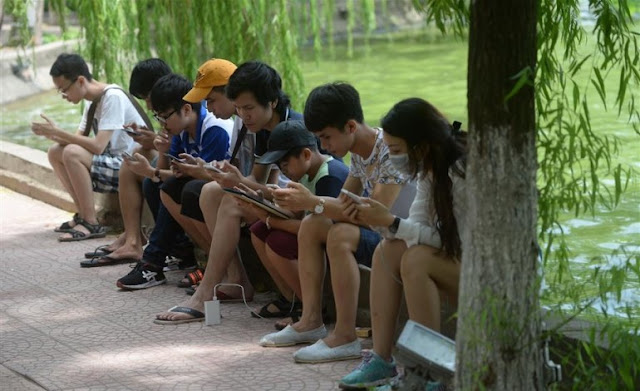 |
| Calmer days: In this May 9,2018, photo, Dr Mahathir with Muhyiddin speaking to reporters after the results of GE14 was announced. Yesterday, the King declared Muhyiddin as the Prime Minister. – AP |
On that afternoon, Tun Dr Mahathir Mohamad shockingly announced that he quit as the Prime Minister.
The tycoon and I were discussing the botched Sunday game plan to install a Perikatan Nasional (or is it Pakatan Nasional?) government.
Something awry had happened which went against the playbook of the Perikatan Nasional plotters.
Was it because the rule of the game was changed?
Was it that the politicians had played each other out?
Was there a game within a game?
In this fast-paced political game, the entire truth has not surfaced, but soon we’ll know.
Tuesday and Wednesday’s process of the King meeting 220 MPs (except for Dr Mahathir and Padang Regas MP Datuk Seri Nazri Aziz who was overseas) individually looked like a done deal. Pakatan Harapan, Parti Pribumi Bersatu Malaysia (which quit PH on Monday), sacked PKR deputy president Datuk Seri Azmin Ali and his 10 MPs, and other minor parties had endorsed Dr Mahathir.
Then came the game within the game.
On Tuesday, after their MPs met the King individually, PKR, DAP and Amanah (which are in Pakatan Harapan) announced that it had backed PKR president Datuk Seri Anwar Ibrahim.
From a quick MPs calculation, PH with 92 MPs minus Barisan Nasional/PAS/PBRS with about 60 MPs (who not all are voting according to party line) which voted for bubar (Parliament dissolved), it was clear that Dr Mahathir had lost the vote count.
Many thought that the master of the game, Dr Mahathir, kena game (had been played).
On Thursday, Dr Mahathir – without waiting for the King to reveal the outcome of his majesty’s face to face meeting with individual MPs – declared there was no prime minister candidate with a clear majority. The interim Prime Minister announced there would be a special Parliament sitting on March 2 to determine who will be the next prime minister.
However, on Friday, the Parliament Speaker Tan Sri Mohd Ariff Yusof announced that there would not be a special Parliament sitting to determine who will be prime minister.
On that day, Yang di-Pertuan Agong Al-Sultan Abdullah Ri’ayatuddin Al-Mustafa Billah Shah decided to give party leaders who have MPs in the Dewan Rakyat the opportunity to nominate a prime minister.
The frontrunners to be our next PM were Bersatu president Tan Sri Muhyiddin Yassin and PKR president Anwar. Seemingly, Dr Mahathir was out of the game.
The fight was shaping up to be Perikatan Nasional (a Muslim and Bumiputera majority government) versus Pakatan Harapan (a non-Muslim majority government).
From the WhatsApp messages I could barely have time to monitor, the rakyat choice depended on who they hated the most.
Some who hated DAP supported the Perikatan Nasional government and those who hated Umno and PAS preferred the Pakatan Harapan government.
Grassroots politicians were getting emotional. Some were hysterical that they have to swallow the hate words they uttered against their political enemies as they might be in the same government.
Last night, a retired veteran journalist WhatsApp-ed me: “Instead of the tik-tok of the horse race and the numbers, why isn’t anyone reporting what this is all about: a battle for Malaysia’s future and what kind of country we want to be?
“A Malaysia focused on race and religion, or a Malaysia focused on building a better tomorrow in the Digital Age?”
I agree with him.
But the game is played fast and furious that we’re trying our best to keep pace with it.
Based on a quick calculation of MPs from political parties, in the numbers game, Muhyiddin had more than Anwar.
Bersatu 36 MPs (from 26 overnight it increased by 10 MPs with Azmin and gang), Umno 39 MPs, PAS 18 MPs, Gabungan Parti Sarawak 18 MPs and minor parties, Muhyiddin won.
Whereas Anwar only had his Pakatan Harapan ally (PKR 39 MPs, DAP 42 MPs and Amanah 11 MPs).
Game over for Anwar?
No. On Friday night, it became clear that the party leaders had no control of their MPs who had different allegiance. Karma had struck Bersatu – it was civil war between Team Mahathir and Team Muhyiddin.
Some sleeper MPs were awakened to go against their party leader.
Some MPs are honourable.
Some are for sale.
Not surprising as this is the games politicians play.
The shocker was yesterday. Dr Mahathir was back in the game.
The interim Prime Minister had thrown his name in the Game of Thrones. He was now the game-changer.
Some of those who backstabbed him when they met the King on Tuesday and Wednesday were now backing him.
Yesterday, the situation was very fluid. Too many games played and play outs.
I would have preferred a bubar endgame.
Let the rakyat be the kingmakers instead of MPs.
The endgame turn out to be the king declaring Muhyiddin as Prime Minister.
To the winners of the Game of Thrones, I wish them: GGWP (Good Game, Well Played).

























 No prizes for guessing what these folks at a public park in the centre of Hanoi are doing. Yes, the Pokemon Go craze has spread far and wide. Photo: AFP
No prizes for guessing what these folks at a public park in the centre of Hanoi are doing. Yes, the Pokemon Go craze has spread far and wide. Photo: AFP








